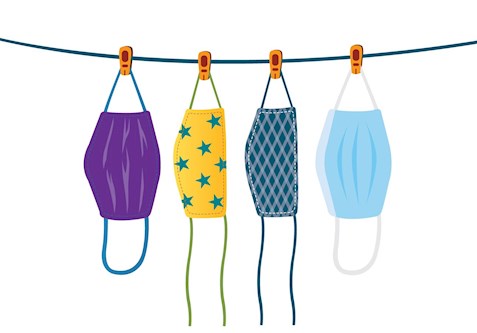Wearing Means Caring

Stop the Spread and Stay Safe
Wearing a mask in public reduces the spread of COVID-19 infection by containing respiratory droplets—which are invisible to the naked eye—that are released each time we talk, and in greater degrees, when we cough, sneeze, shout or sing.
So why wear a mask? It’s a simple step to take to protect others, save lives and stop the spread of COVID-19.
Types of Face Masks
N95 face mask: Also a type of respirator, N95 masks provide better protection than surgical masks, and filter out both large and small particles as the wearer inhales. Because N95 masks provide such a high level of protection, The Centers for Disease Control and Prevention (CDC) recommends that these critical supplies remain reserved for healthcare providers caring for
sick patients.
Medical or surgical mask: Often used by healthcare workers. They are disposable and often manufactured using non-woven fabrics like polypropylene, with different styles and grades depending on the level of protection the user requires.
Cloth face mask: While there has been debate, cloth masks are effective. When worn correctly, they create barriers and make it harder for droplets emitted from sneezing, coughing and speaking to reach others. The Center for Disease Control and Prevention (CDC) recommends cloth masks that are made from tightly-woven fabrics—like bed sheets. Stretchy materials, or fabrics that can be seen through when held up to light, are not as effective. Recent CDC studies have also concluded that masks with vents or valves do more harm than good.
Frequently Asked Questions
Where should I wear a face mask?
If you are in a public place—especially where there are a lot of people—wear a mask. Even when outside, if there are too many people to socially distance (staying six feet from others), wear a mask.
What’s the proper way to wear a mask?
Wash your hands before, and after, touching the mask, and handle masks by the bands or ties. A mask should cover your nose, mouth and chin and can be loose-fitting, as long as it’s secure, so you’re not tempted to reposition it repeatedly—limiting its effectiveness. Wash reusable masks after each use, or at least every day. Discard disposable masks after each use, or when they are visibly soiled or damaged.
How often do I wash my cloth mask?
Masks should be washed daily. While it’s not convenient to add more laundry to your pile, when it comes to potentially infectious particles, err on the side of caution. Wash masks with your regular laundry, in the warmest temperature setting appropriate for the cloth used to make the mask.
Will I get sick from breathing in the air I am exhaling?
In a word, no. Some fear that carbon dioxide from exhaling gets trapped under masks causing illness, but this simply isn’t true. Many people wear masks for long periods of time for protection in their jobs. A properly fitted mask, with good airflow, will not cause adverse effects from carbon dioxide.
Should everyone wear a mask?
Yes. Everyone over the age of two should wear a mask when out in public, especially when inside. People with developmental disabilities or mental health conditions are advised to speak with their providers for guidance about wearing masks.



